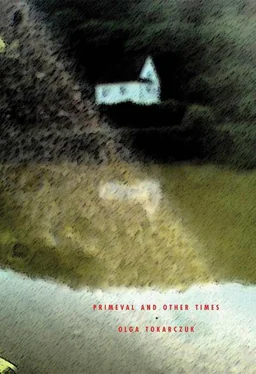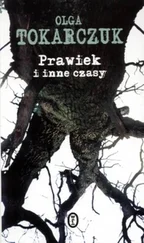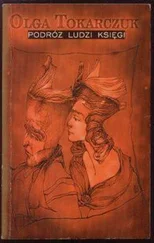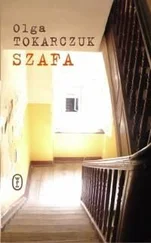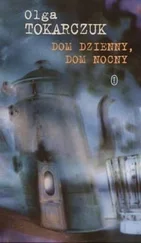Misia had always been lovely, from the first time he saw her outside the house, playing in the sand. He fell in love with her at once. She fitted perfectly in the small devastated space in his soul. He gave her the coffee grinder he had brought from the East as a war trophy. With the grinder he surrendered himself into the little girl’s hands, to be able to start everything anew.
He watched as she grew, as her first teeth fell out, and in their place new ones appeared – white, too large for her little mouth. With sensuous pleasure he watched the nightly unplaiting of her braids and the slow, sleepy motions of her hairbrush. Misia’s hair was at first chestnut, then dark brown, and it always had red lights, like blood, like fire. Michał wouldn’t let it be cut, even when, matted with sweat, it stuck to her pillow during illness. That was the time the doctor from Jeszkotle said Misia might not survive. Michał fainted. He slipped off his chair and fell on the floor. It was clear what Michał’s body was saying by this fall – if Misia died, he would die, too. Just like that, literally, without a doubt.
Michał didn’t know how to express what he felt. It seemed to him that anyone who loves is constantly giving. So he was always giving her little surprises, seeking out shiny stones for her in the river, carving little pipes out of willow, blowing eggs, folding birds out of paper, and buying toys in Kielce – he did whatever might please a little girl. But he cared most of all about big things, of the kind that are permanent, and also beautiful, of the kind time communes with, rather than man. These things were meant to stop time for his love forever. And to stop time for Misia forever. Thanks to them, their love would be eternal.
If Michał had been a powerful ruler, he would have constructed a huge building for Misia on a mountaintop, beautiful and indestructible. But Michał was just an ordinary miller, so he bought Misia clothes and toys, and made her paper birds.
She had the most dresses of all the children in the neighbourhood. She looked as beautiful as the young ladies from the manor house. She had real dolls, bought in Kielce, dolls that blinked, and when turned on their backs they let out a squeal that was meant to sound like a baby crying. She had a wooden pram for them, two prams even – one was made out of a dismantled kennel. She had a two-storey doll’s house and several teddy bears. Wherever Michał went, he always thought of Misia, and always missed her. He never raised his voice to her.
“If you’d only smack her on the bottom once,” said Genowefa peevishly.
The very thought that he might hit this trusting little body caused Michał to feel weak, in the same way that had once ended in him fainting. That was why Misia often ran from her angry mother to her father. She would hide in his flour-whitened jacket like a little animal. He would stop in his tracks, amazed over and over again at her pure, unsullied trust.
When she started going to school, every day he took a short break from his work in the mill to go out onto the bridge and see her coming back. Her small figure would emerge by the poplars – the sight of her restored everything Michał had lost since Misia had left that morning. Then he would look over her exercise books and help with her lessons. He also taught her Russian and German. He guided her little hand across all the letters of the alphabet. He sharpened her pencils.
Then something began to change, in 1929. By then Izydor had been born, and the rhythm of life had changed. One day Michał saw both of them, Misia and Genowefa, as they were hanging out the washing, both the same height, in white headscarves, and the underclothes on the lines – tops, brassieres, and petticoats, one set just a little smaller than the other, women’s clothes. For a moment he wondered whose the smaller ones were, and when he realised, he felt disconcerted, like a young boy. Until now the petite size of Misia’s clothes had aroused his affection. Now, as he looked at the lines of washing, he was filled with anger at the idea that time could run so fast. He would have preferred not to see that underwear.
At the same time, maybe a little later, one evening before falling asleep, in a drowsy voice Genowefa told him Misia had already started her periods. Then she nodded off, cuddling up to him and sighing in her sleep like an old woman. Michał couldn’t fall asleep. He lay and stared into the darkness. When he finally got to sleep, he had a dream, bizarre and disjointed.
He dreamed he was walking along a border, and on both sides grew corn, or maybe tall, yellow grass. He could see Cornspike going along it. She was holding a sickle, and using this sickle to cut spikes of grass.
“Look,” she said to him. “They’re bleeding.”
He leaned forward, and indeed, on the cut blades of grass he saw drops of blood welling up. It seemed to him unnatural and dreadful. He began to feel afraid. He wanted to get out of there, but when he turned around, he saw Misia in the grass. She was wearing her school uniform, lying there with her eyes closed. He knew she had died of typhoid.
“She’s alive,” said Cornspike. “But it’s always the case that at first you die.”
She leaned over Misia and said something into her ear. Misia woke up.
“Come on, let’s go home.” Michał took his daughter by the hand and tried to pull her after him.
But Misia was different, as if she hadn’t yet gained consciousness. She wasn’t looking at him.
“No, Papa, I have so many things to do. I’m not coming.”
Then Cornspike pointed at her lips.
“Look, she’s not moving her lips when she speaks.”
Michał understood in the dream that Misia had been touched by a sort of death, an incomplete death, but just as paralysing as real death.
November 1928 was rainy and windy. And so it was the day Genowefa gave birth to her second child.
As soon as Kucmerka the midwife had rushed over, Michał took Misia to the Serafins. Serafin put a bottle of vodka on the table, and soon the other neighbours arrived. They all wanted to drink to Michał Niebieski’s offspring.
At the same time Kucmerka was heating water and preparing the sheets. Moaning monotonously, Genowefa was pacing the length of the kitchen.
At the same time in the autumn firmament Saturn was spreading out in Sagittarius like a great iceberg. Mighty Pluto, the planet that helps to cross all manner of borders, was lodged in Cancer. That night he took Mars and the delicate Moon in his arms. Within the harmony of the eight heavens, the sensitive ears of the angels picked up a clattering sound like the noise of a cup falling and smashing to smithereens.
At the same time Cornspike had just swept the room and squatted down in the corner over a bundle of last year’s hay. She had begun to give birth. It took a few minutes. She bore a large, beautiful baby. The room was filled with the scent of masterwort.
At the same time at the Niebieskis’, when the little head appeared, Genowefa started having complications. She fainted. The terrified Kucmerka opened the window and shouted into the darkness:
“Michał! Michał! People!”
But the gale drowned her voice, and Kucmerka realised she would have to manage on her own.
“You’re a weakling, not a woman!” she shouted at the swooning Genowefa to give herself courage. “Fit for dancing, not child bearing. You’ll smother the child, you’ll smother it…”
She slapped Genowefa’s face.
“Christ Almighty, push! Push!”
“A daughter? Son?” raved Genowefa and, brought round by pain, began to push.
“Son, daughter, what’s the difference? Come on, again, again…”
Читать дальше
